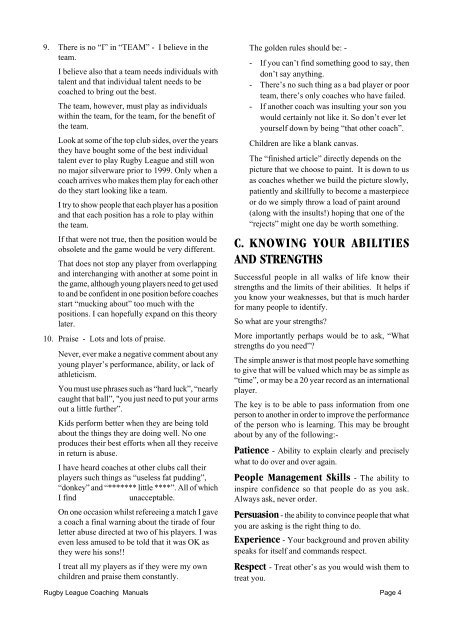Junior Coaching Book (1).pdf
Junior Coaching Book (1).pdf
Junior Coaching Book (1).pdf
You also want an ePaper? Increase the reach of your titles
YUMPU automatically turns print PDFs into web optimized ePapers that Google loves.
9. There is no “I” in “TEAM” - I believe in the<br />
team.<br />
I believe also that a team needs individuals with<br />
talent and that individual talent needs to be<br />
coached to bring out the best.<br />
The team, however, must play as individuals<br />
within the team, for the team, for the benefit of<br />
the team.<br />
Look at some of the top club sides, over the years<br />
they have bought some of the best individual<br />
talent ever to play Rugby League and still won<br />
no major silverware prior to 1999. Only when a<br />
coach arrives who makes them play for each other<br />
do they start looking like a team.<br />
I try to show people that each player has a position<br />
and that each position has a role to play within<br />
the team.<br />
If that were not true, then the position would be<br />
obsolete and the game would be very different.<br />
That does not stop any player from overlapping<br />
and interchanging with another at some point in<br />
the game, although young players need to get used<br />
to and be confident in one position before coaches<br />
start “mucking about” too much with the<br />
positions. I can hopefully expand on this theory<br />
later.<br />
10. Praise - Lots and lots of praise.<br />
Never, ever make a negative comment about any<br />
young player’s performance, ability, or lack of<br />
athleticism.<br />
You must use phrases such as “hard luck”, “nearly<br />
caught that ball”, "you just need to put your arms<br />
out a little further”.<br />
Kids perform better when they are being told<br />
about the things they are doing well. No one<br />
produces their best efforts when all they receive<br />
in return is abuse.<br />
I have heard coaches at other clubs call their<br />
players such things as “useless fat pudding”,<br />
“donkey” and “******* little ****”. All of which<br />
I find unacceptable.<br />
On one occasion whilst refereeing a match I gave<br />
a coach a final warning about the tirade of four<br />
letter abuse directed at two of his players. I was<br />
even less amused to be told that it was OK as<br />
they were his sons!!<br />
I treat all my players as if they were my own<br />
children and praise them constantly.<br />
The golden rules should be: -<br />
- If you can’t find something good to say, then<br />
don’t say anything.<br />
- There’s no such thing as a bad player or poor<br />
team, there’s only coaches who have failed.<br />
- If another coach was insulting your son you<br />
would certainly not like it. So don’t ever let<br />
yourself down by being “that other coach”.<br />
Children are like a blank canvas.<br />
The “finished article” directly depends on the<br />
picture that we choose to paint. It is down to us<br />
as coaches whether we build the picture slowly,<br />
patiently and skillfully to become a masterpiece<br />
or do we simply throw a load of paint around<br />
(along with the insults!) hoping that one of the<br />
“rejects” might one day be worth something.<br />
C. KNOWING YOUR ABILITIES<br />
AND STRENGTHS<br />
Successful people in all walks of life know their<br />
strengths and the limits of their abilities. It helps if<br />
you know your weaknesses, but that is much harder<br />
for many people to identify.<br />
So what are your strengths?<br />
More importantly perhaps would be to ask, “What<br />
strengths do you need”?<br />
The simple answer is that most people have something<br />
to give that will be valued which may be as simple as<br />
“time”, or may be a 20 year record as an international<br />
player.<br />
The key is to be able to pass information from one<br />
person to another in order to improve the performance<br />
of the person who is learning. This may be brought<br />
about by any of the following:-<br />
Patience - Ability to explain clearly and precisely<br />
what to do over and over again.<br />
People Management Skills - The ability to<br />
inspire confidence so that people do as you ask.<br />
Always ask, never order.<br />
Persuasion - the ability to convince people that what<br />
you are asking is the right thing to do.<br />
Experience - Your background and proven ability<br />
speaks for itself and commands respect.<br />
Respect - Treat other’s as you would wish them to<br />
treat you.<br />
Rugby League <strong>Coaching</strong> Manuals Page 4


